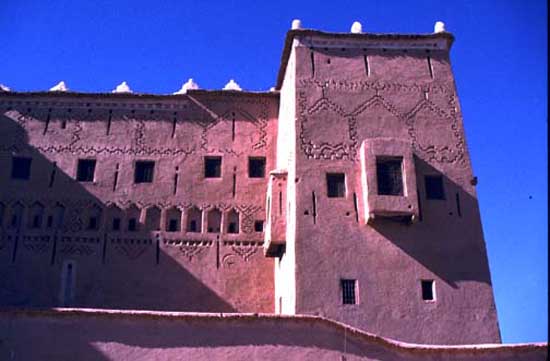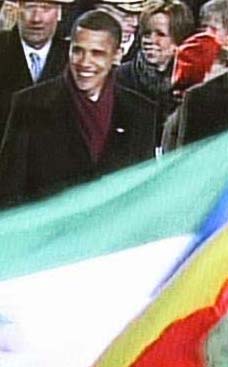
Local supermarkets and organic produce markets in America would not be able to replace a Moroccan suq, especially the one in Azrou, the largest in the region. The town of Azrou was built around the suq. The suq is an array of colors, hustle and bustle and an endless time of greeting, pushing, yelling, gossiping and laughing. There is fresh produce, herbs and spices that have a set price, the rest of the items require bargaining, one of the true delights of Moroccan shopping. Bargaining is best conducted when accompanied by Moroccan friends, because no matter how fluent I become in the language, I still lose. I don't blame the salesmen for being profiteers, but I much prefer getting the local price. I only go to the suq on Tuesday when feeling social, since everyone wants to talk to the foreigner (nasaraniya or gawriya). When called at, I take a proactive approach and respond with a witty comment in Moroccan Arabic. Everyone is thrilled to hear me speak their language — well, sort of.
Morocco Peace Corps Volunteer Madeleine Meek writes: Moroccan social centers: The market and the bath
Moroccan social centers: The market and the bath
By Madeleine Meek
January 26, 2009 | 05:23 PM
As I only have a few months left of my Peace Corps service, I have begun to think about the facets of Moroccan life I will miss the most. While the people in my village are top on the list, the weekly market (suq) and the public baths (el-hammam) follow close behind. These are the two main social centers in Morocco, where people gather and gossip weekly while conducting the essential business of shopping and bathing. The suq is my supermarket — only open one day per week, and el-hammam is my shower — shared with other women during a two-hour weekly cleaning ritual.
Local supermarkets and organic produce markets in America would not be able to replace a Moroccan suq, especially the one in Azrou, the largest in the region. The town of Azrou was built around the suq.
The suq is an array of colors, hustle and bustle and an endless time of greeting, pushing, yelling, gossiping and laughing. There is fresh produce, herbs and spices that have a set price, the rest of the items require bargaining, one of the true delights of Moroccan shopping. Bargaining is best conducted when accompanied by Moroccan friends, because no matter how fluent I become in the language, I still lose. I don't blame the salesmen for being profiteers, but I much prefer getting the local price.
I only go to the suq on Tuesday when feeling social, since everyone wants to talk to the foreigner (nasaraniya or gawriya). When called at, I take a proactive approach and respond with a witty comment in Moroccan Arabic. Everyone is thrilled to hear me speak their language — well, sort of.
The other social center in Morocco is el-hammam, the multi-hour bathing ritual that usually includes scrubbing one's body at least three times, cleaning hair twice, a good dose of gossip and occasional yelling and pushing over water and space.
El-hammam typically consists of a changing room and at least three steam rooms with varying degrees of heat. Fancy hammams in cities have hot and cold water faucets at each person's spot, but less extravagant hammams like the one in my village consist of one hot and one cold centrally located faucet with a large tub underneath where excess water gathers. Women have to collect their own water in buckets, which leads to the entertaining yelling and pushing. This is all performed in lighthearted jest, since aggressiveness is more culturally acceptable in Morocco than in America, where I have concluded that we are entirely too polite.
Politeness in most cases will not get you far in rural Morocco. People here raise their voices all the time about the most mundane things. I used to be shocked by this behavior, but now I appreciate it as I realize Moroccans are much more honest in expressing themselves. I have consequently become more assertive and occasionally aggressive since arriving here and I am respected for this behavior. Even in el-hammam I find myself performing the antagonistic customs: pushing women out of the way when they've cut me in line or yelling at them if they're taking up too much space. Readjusting to American culture may prove difficult.
Moroccan women commonly bring several items with them to el-hammam: a plastic mat or stool on which to sit, large buckets to collect water, a small bucket to pour water, a brush or comb, a kis (a very rough scrubbing mitt), pumice stone for the feet, traditional black soap made from olive oil, ghassoul (dried clay to which many women add rose petals and lavender), and other more mainstream soaps and shampoos. Each woman has her own bathing rituals, but it typically takes two to three hours and goes like this:
1) Undress in changing room, except underwear that are left on while bathing;
2) Enter one of the steam rooms, choose the ideal spot, and put down mat or stool;
3) Fill buckets with warm water and relax for a minute before scrubbing begins;
4) Apply black soap to entire body;
5) Rinse the henna (made by crushing the leaves of Lawsonia inermis into a powder) from hair, which has usually been applied the night before. Henna is claimed to soften the hair, while also coloring it a bright orange. This step is optional and often it is older women who apply it;
6) Apply ghassoul to hair and let it sit while scrubbing body. This is optional;
7) Scrub entire body with the kis and ask your neighbor to scrub your back;
8) Shave;
9) Scrub entire body again with kis and ask your neighbor to scrub your back;
10) Rinse ghassoul if applied, and then wash hair once or twice with shampoo;
11) Scrub entire body with kis for the last time and ask your neighbor to scrub your back again;
12) Apply soap or body wash all over;
13) Rinse several times and then exit the steam rooms;
14) Relax in changing room while wrapped in towel or bathrobe;
15) Dress and leave.
I am addicted to el-hammam and will miss it more than the suq. When I take a shower I do not feel nearly as clean. I await the next time I can go to el-hammam and use the kis to scrub off layers of dirt, dust, and skin — called spaghetti or couscous by the locals when it peels off.
Upon leaving el-hammam, someone will say to you "bissaha" (to your health) to which you respond "Allah ytik saha" (and may God give you health). Along with the suq and el-hammam, I will also miss these Arabic expressions, often communicated in a call and response fashion.
Upon my return to America, there are certain aspects of life in Morocco that I will only be able to share with my fellow Peace Corps volunteers. At least once a year after our service ends, we will have to shop at outdoor markets while suited in jellabas, make couscous and sweet mint tea, speak Moroccan Arabic and Tamazight and yell at each other lightheartedly about mundane things, set up hammams in our homes and scrub each other's backs, slaughter a sheep (or not!), and try to emulate the generosity and hospitality of Moroccan culture.













